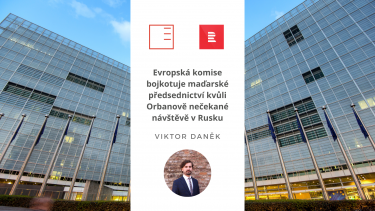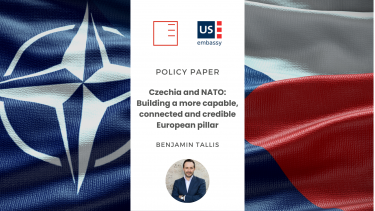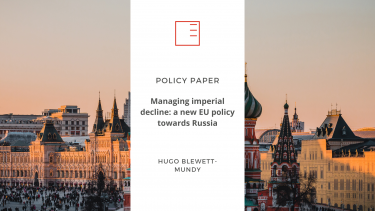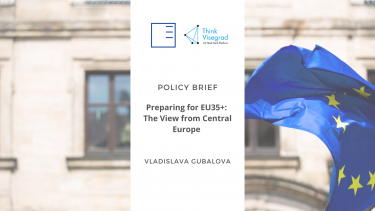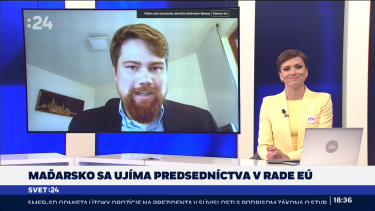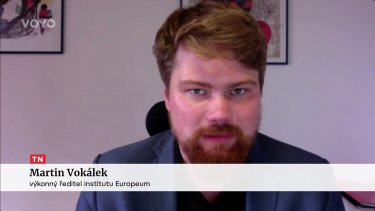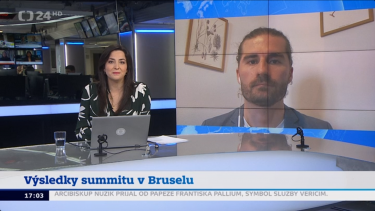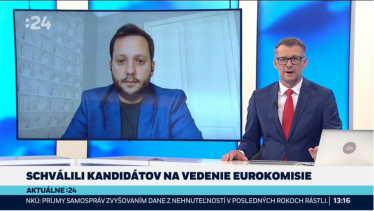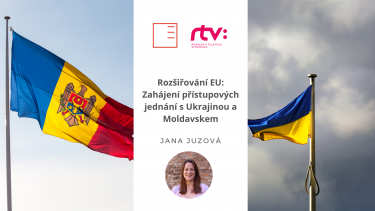ČRo | The European Commission boycotts the Hungarian presidency due to Orban's unexpected visit to Russia
The European Commission has announced that, in light of developments since the beginning of the Hungarian presidency of the Council of the European Union, it plans to boycott informal ministerial meetings and send only senior officials instead of commissioners. Viktor Orbán has come under criticism for his recent trip to Russia, which he described as a peace mission aimed at ending the war in Ukraine and which he did not consult with the leaders of other EU states. This move comments Viktor Daněk, deputy director of EUROPEUM Institute for Czech Radio.
Show morePolicy paper | Czechia and NATO: Building a more capable, connected and credible European pillar
CEE allies are key to building the capabilities-based, European Pillar NATO needs to enact genuine burden shifting and secure the alliance’s future. Dr Benjamin Tallis shows how Czechia can build on recent progress in defense procurement and increase its influence by prioritising the six elements Euro-NATO needs: core national war-fighting capabilities, logistics, military mobility, strategic enablers, air defence and long-range strategic strike.
Show morePolicy paper | Managing imperial decline: a new EU policy towards Russia
Russia's full-scale invasion of Ukraine in February 2022 has shattered the post-Cold War international order built upon East-West interdependence and cooperation. The European Union (EU) - which had tried to pursue a strategic relationship with Russia after the collapse of the Soviet Union in 1991 - must now adapt to the geopolitical reality of Russian neo-revisionism. Hugo Blewett-Mundy, an Associate Research Fellow at EUROPEUM Institute, identifies four areas where the EU's policy towards Russia could evolve to confront this emerging security situation in Europe.
Show morePolicy Brief | Preparing for EU35+: The View from Central Europe
Despite the historical support of EU enlargement policy by the Visegrad Four (V4), these Central European states are now faced with the challenge of reconciling their stances with the new realities of the process. As Ukraine and Moldova opened their accession negotiations, the EU seems to be torn on the questions associated with the future enlargement(s) - institutional reforms and changes within the EU budget. Transitioning from economic beneficiaries to potential contributors, the V4 states must evaluate the potential political and economic impacts of new members on both the EU and their domestic levels. Writes and proposes recommendations Vladislava Gubalova from GLOBSEC.
Show moreTA3 | Questions about the Hungarian Presidency
Make Europe Great Again is the motto of the Hungarian Presidency of the Council of the European Union. Hungary has set seven priorities, including fighting illegal migration and strengthening European defense. But the next six months raise many questions about the direction the Union will take under Budapest's leadership and what it will mean for Ukraine. Žiga Faktor, deputy director and head of the Brussels office of EUROPEUM Institute, explains the situation for Slovak TV TA3.
Show more
RTVS | Hungary takes over the Presidency of the EU
From this day Hungary holds the Presidency of the EU. It takes over the Presidency from Belgium and will set the European agenda until the end of the year. The Hungarian Presidency says it wants to find real solutions to real problems. But some analysts fear that important issues, including support for Ukraine, could take a back seat. Martin Vokálek, executive director of EUROPEUM Institute, comments for RTVS.
Show more
TV Nova | The far right wins the first round of parliamentary elections in France
The far-right National Rally of Marine Le Pen wins the first round of the early parliamentary elections in France. The foreign media are talking about the end of the Macron era, but he is not giving up and has called on the French people to vote against the far right. Martin Vokálek, executive director of EUROPEUM Institute, comments for TV Nova on what is driving voters to the far right and what the situation is in France.
Show more
ČT24 | Who will get the top jobs in the European Union?
EU leaders nominate Ursula von der Leyen to lead the European Commission again. Estonian Prime Minister Kaja Kallas, known for her support for Ukraine, is to lead EU's foreign policy. Both women have yet to be confirmed in top jobs by the European Parliament. In addition to the majority, support may also have to be sought from the conservatives or the Greens. Viktor Daněk, deputy director of EUROPEUM Institute, comments for ČT24.
Show moreRTVS | EU and Ukraine have concluded a comprehensive security agreement in Brussels
The European Union and Ukraine concluded a comprehensive security agreement in Brussels. This builds upon the EU's longstanding support for Ukraine. What did the politicians agree upon? What is new in the new treaty? Žiga Faktor, Deputy Director and Head of the Brussels Office at the EUROPEUM Institute, commented for the Slovak RTVS.
Show more
RTVS | EU Enlargement: Initiation of Accession Negotiations with Ukraine and Moldova
The European Union has initiated accession negotiations with Ukraine and Moldova. What does this mean for its inhabitants? How do the accession talks proceed? And what must the countries fulfill? Jana Juzová, a senior researcher at EUROPEUM Institute, comments for Slovak RTVS Television.
Show moreStaroměstské náměstí 4/1
Prague 1 - Staré Město
110 00
tel.: +420 212 246 552
email: europeum@europeum.org
https://www.europeum.org
